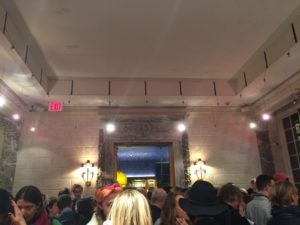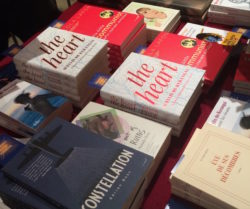It was wonderful to celebrate the launch of the Albertine Prize last night, a new readers’ prize for French fiction published in English translation in 2016, and to discover the shortlist of 10 books. The event was rescheduled from March 14 due to the blizzard, and although there were still mountains of snow in the streets, it did nothing to dampen the festive spirit of the gathering. At the Albertine Bookstore in the French Consulate, four talented actors (Matthew Brown, Eleanor Hutchins, Oceana James, and Zach Lusk) read selections from the novels in different rooms of the historic building.

Online voting has started at Albertine.com. Three finalists will be announced on April 14, kicking off a second round of voting. The online vote will end on April 30, and the winner will be announced in a ceremony on June 6, 2017 hosted by the Albertine Prize Honorary Chairs, author and translator Lydia Davis and French literary critic and TV host François Busnel. The $10,000 prize will be split between the author and translator.
Here are 6 takeaways from the evening:
1. There is a wide range of topics, tones, and places covered by current fiction in French, ranging from a novel based on the true story of the disappearance of a French airplane and its 38 passengers in 1949 (Constellation), to the wrenching tale of four young Mauritians trapped in their country’s endless cycle of fear of violence (Eve Out of Her Ruins), to the tale of a Moroccan boy who is tempted by jihad (Infidels).
2. Best quote of the evening: “I realized that in order to write something short, you had to know a great deal.” (Suite for Barbara Loden)
3. Opening that left me wanting more: Couple Mechanics begins with the main character, Juliette, enjoying a pleasant day in the park with her children and a friend, when she receives a phone call from her husband, Olivier, informing her that he has been seeing another woman for three weeks and that she is demanding that he leave his wife. The telling details, such as the flow of Juliette’s thoughts about the trash found in the river as she answers the call, establish the forceful psychological realism of the events, which have all the brutal randomness of real life.
4. Ananda Devi tackles a powerful scene with precise and subtle language. My friend Valeriya and I were blown away by the excerpt that Oceana James read from Eve Out of Her Ruins, a first-person account of a young girl’s feelings of powerlessness and her first experience of a boy wanting — and taking — something from her. The lingering details and the carefully constructed description of her younger self’s hazy awareness of what is happening, and of how she feels about it, were both heart-wrenching and compelling. Jeffrey Zuckerman’s translation channels the quiet power of these descriptions of inner and outer states down to every last nuance.
5. People like hearing stories! So many literary and translation events are panels or roundtable discussions, and of course these have their place, but there is something so captivating, and so fun, about sitting down to hear a story, even if it leaves you wanting more.
6. You don’t have to read all 10 books to vote for the Albertine Prize! If you discover one you like, support it by voting on Albertine.com. Here’s the list of books nominated for the award:
Couple Mechanics by Nelly Alard, translated by Adriana Hunter, Other Press
Constellation Adrien Bosc, translated by Willard Wood, Other Press
Eve Out of Her Ruins by Ananda Devi, translated by Jeffrey Zuckerman, Deep Vellum
The Heart by Maylis de Kerangal, translated by Sam Taylor, Picador
The Little Communist Who Never Smiled by Lola Lafon, translated by Nick Caistor, Seven Stories Press
Suite for Barbara Loden by Nathalie Léger, translated by Natasha Lehrer and Cécile Menon, Dorothy, a publishing project
Ladivine by Marie NDiaye, translated by Jordan Stump, Knopf
Infidels by Abdellah Taïa, translated by Alison L. Strayer, Seven Stories Press
Naked by Jean-Philippe Toussaint, translated by Edward Gauvin, Dalkey Archive
Bardo or Not Bardo by Antoine Volodine, translated by J.T. Mahany, Open Letter Books

